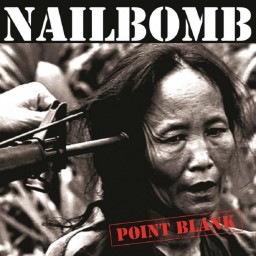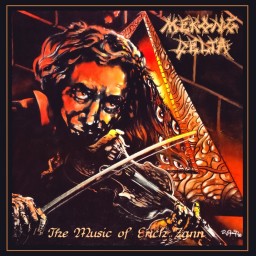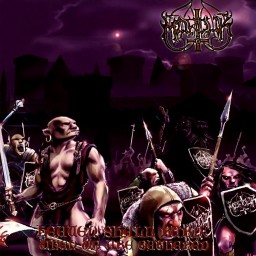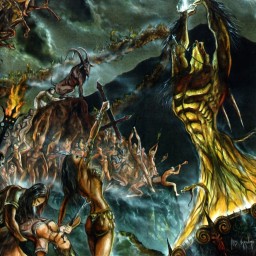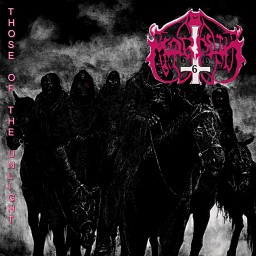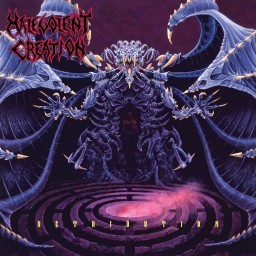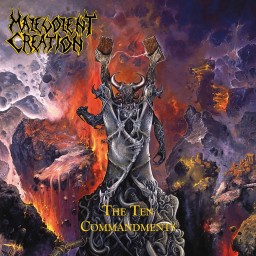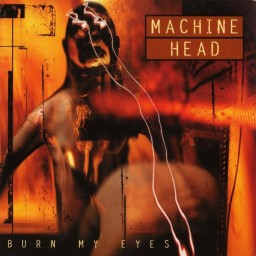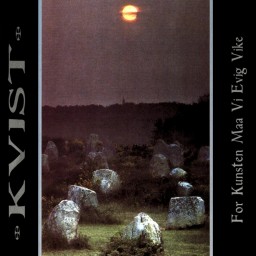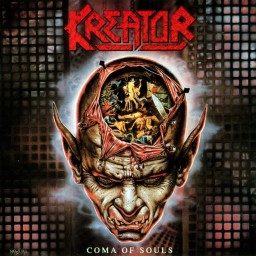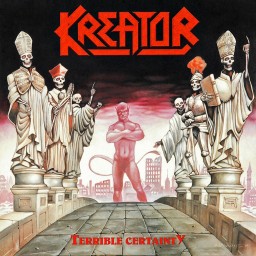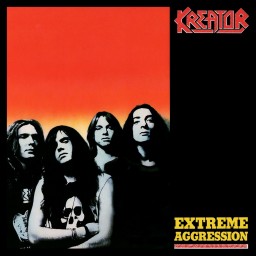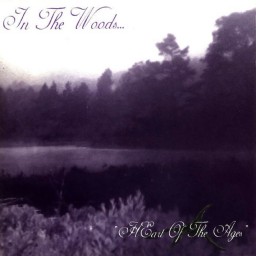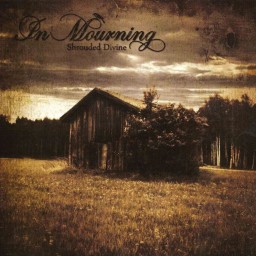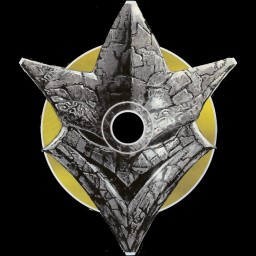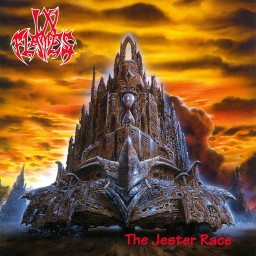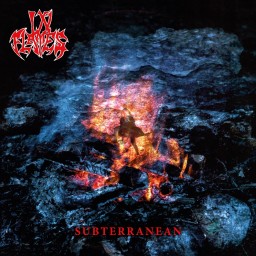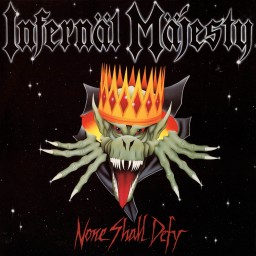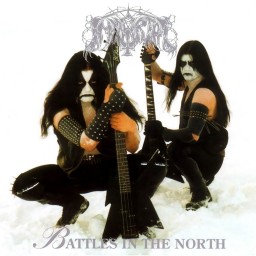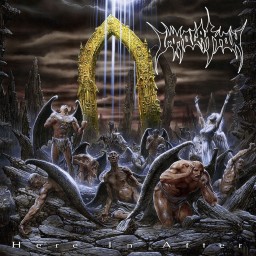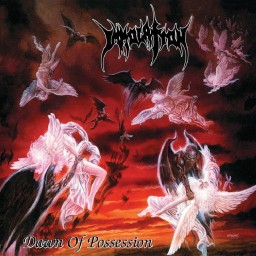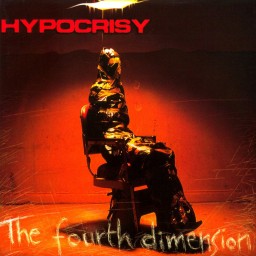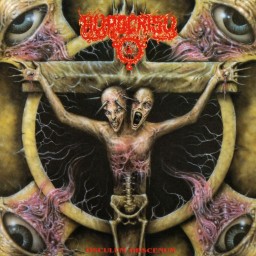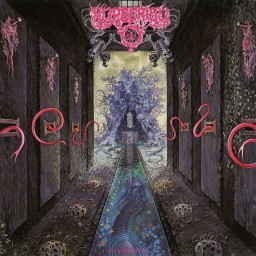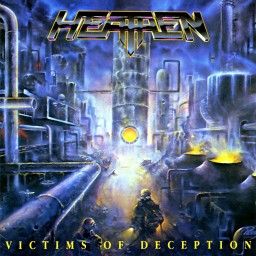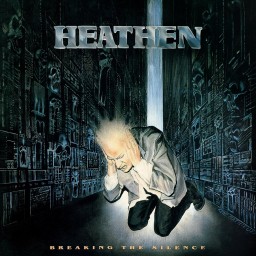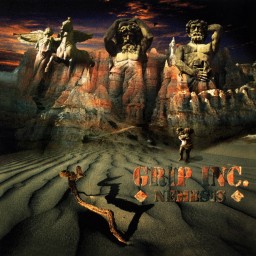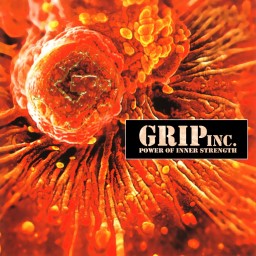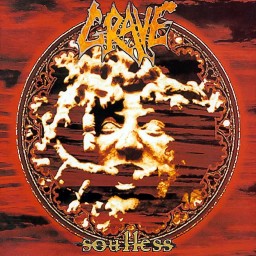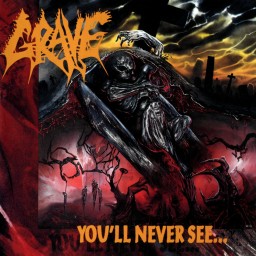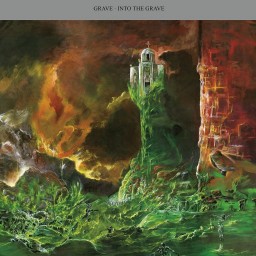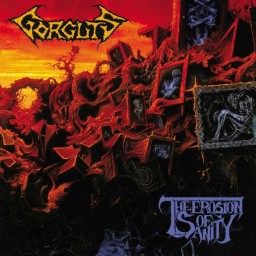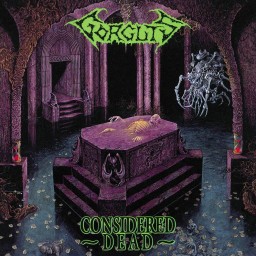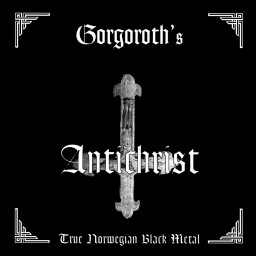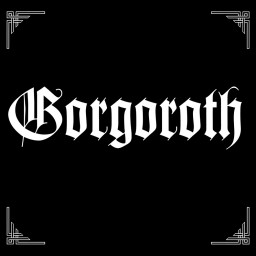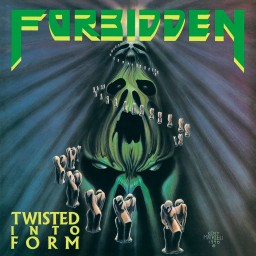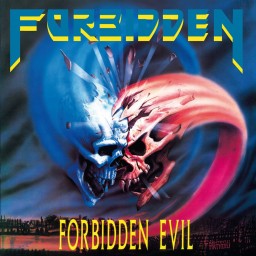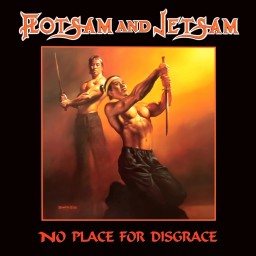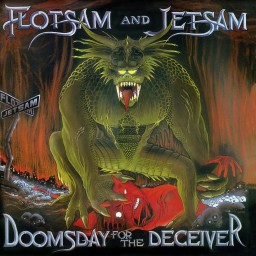Ben's Reviews
Entertaining industrial thrash metal project that's worth checking out.
Point Blank is one of those forgotten albums that never fails to bring a smile or two when it crosses my path. Being a side project of Fudge Tunnel frontman Alex Newport and Sepultura front man Max Cavalera (with guest appearances by Igor Cavalera, Andreas Kisser, Dino Cazares and more), Point Blank was always going to be an interesting proposition. Taking influence from both member's musical backgrounds, Nailbomb produce world issue themed thrash metal with a high dose of punk and industrial metal injected into proceedings.
The album is very bass driven and the drum sound is crunchy and powerful. There really isn't much shredding guitar work going on and for the most part the tracks are slow yet intense. My personal preferences have never really included hardcore punk style music and so I must admit that the punkier sections on offer don't entirely float my boat. But the more thrashy and industrial tinged tracks (such as Wasting Away, Guerillas, Sum of Your Achievements and For Fuck's Sake) are thoroughly entertaining and make Nailbomb a nice enough project that fans of industrial metal (a thrashier Ministry comes to mind) should check out.
Genres: Industrial Metal Thrash Metal
Format: Album
Year: 1994
This is a great album and I have no idea why Mekong Delta are not more well known amongst fans of progressive thrash metal. The band hail from Germany, but don't expect 80s German thrash metal in the style of Sodom or Kreator. This is extremely creative at times and while the band know how to thrash, a lot of the album explores other aspects of heavy music. The name of the album originated as a short story by acclaimed horror author HP Lovecraft. It chronicled the strange life of a man called Erich Zann who played music of an otherworldly nature to ward off unseen monsters from entering his apartment. Not only is this a brilliant idea for an album concept, but it allows Mekong Delta to add a touch of intriguing madness to their work.
The riffs are of the more shredding thrash variety, the leads are exciting and technically great. The vocalist comes from the school of Bon Scott, Joey Belladonna high pitched range, yet I think it suits this music perfectly. The band play around successfully with Meshuggah like off times and there is a whole bunch of variety throughout. Interludium is a wonderful metallic version of the theme music from Hitchcock's Psycho. I, King, Will Come and bonus track The Gnome drop the speed down a notch to explore other atmospheres. But most of the time, Mekong Delta play damn entertaining riff-based thrash metal that makes me want to check out the rest of their discography. Highlights for me are Age of Agony, Confessions of Madness, Hatred and Interludium.
Genres: Thrash Metal
Format: Album
Year: 1988
The band evolves with a killer production and unprecedented brutality.
When I go back over the Marduk discography, it really is surprising how much melody was infused into their early albums. Those of the Unlight and Opus Nocturne contain fantastic melodies behind all the evil atmosphere that made them entertaining listens. When you compare these albums to later releases such as Panzer Division Marduk, it really doesn't sound like the same band at all. Later albums would be filled with endless blastbeats, cold militaristic riffs and relentless, venomous vocals. So where does Heaven Shall Burn...When We Are Gathered sit within all this? Somewhere in between really. I can still hear remnants of that melody, but it's clearly where Marduk decided to ramp up the aggression to unprecedented levels, kickstarting a style they would continue with right through to today.
When I first pressed play back in 1996, I was stunned at how completely vicious this album is. Beyond the Grace of God and Infernal Eternal showed the Marduk I already loved, complete with awesome melodies, but with a monstrous production and a brutality unrivalled by anything I'd experienced in black metal prior. Fredrick Andersson's drumming is superb and Morgan's riffs exhilarating. The new vocalist Legion contained enough venom to kill unsuspecting bystanders and through all this wonderful darkness, B War's bass was still miraculously audible! These two tracks had me chomping at the bit for more and I thought these Swedes had hit the black metal jackpot. Sadly, Heaven Shall Burn...When We Are Gathered doesn't quite manage to maintain this high level for its entirety.
It all starts to go a bit awry with Glorification of the Black God. The band decided it was a great idea to transform a recognisable piece of classical music into a black metal riff. The idea was obviously to create an imposing mood of darkness, but the result is tacky to say the least. The rest of the track is great, but I cringe every time those sections kick in. I could have forgiven the band for this little creative misadventure if it hadn't been for the next track Darkness it Shall Be. This must be one of the most infuriatingly repetitive and boring black metal tracks ever made. It repeats the same structure repeatedly to a backdrop of blastbeats for close to five minutes! It's a perfectly decent verse/chorus structure, but by halfway through I'm reaching desperately for the skip button.
Thankfully, the album does manage to pick up the ball that it dropped after such a grand beginning. The Black Tormentor of Satan and Legion are both excellent and Dracul Va Domni Din Nou in Transilvania even slows things down, adding some much-needed variety to proceedings. But I can't help feeling like Heaven Shall Burn...When We Are Gathered could have been an album we talk about when discussing top 10 black metal albums. Its influence can be felt in stacks of modern metal and a complete album with the quality of the best tracks would most certainly have made a lasting mark in the scene. Unfortunately, Marduk have always struggled to put together a consistently excellent release, and this album is no different. It's still a worthy purchase for anyone into black metal, but it could have been so much more!
Genres: Black Metal
Format: Album
Year: 1996
One of the better Marduk albums, filled with the pure venom we expect, but with better song writing.
This was the first Marduk album I ever purchased, and I have to say it could very well be my favourite. The production is a little strange, with the guitars and vocals being quite low in the mix, but somehow it comes together nicely and doesn't stop the album from being immensely entertaining. Opus Nocturne sits very neatly beneath the rather melodic black metal of Those of the Unlight and the more clinical all-out assault of later albums. It still contains hugely memorable melodies along with masses of blastbeats and black metal brutality, which is why I prefer this release over some of their more one dimensional blastfests such as Panzer Division Marduk.
The fact that I can hear bassist B. War almost the entire time is rather refreshing for a black metal band in this style. Of course, I'd rather Morgan's guitars be a little more upfront, but it gives the album a unique feel and atmosphere. Andersson's drumming is completely amazing as you'd expect for any Marduk album really and vocalist Joakim Af Gravf does a fantastic job with his raspy and evil style perfectly complimenting the album's sound. But while all this musicianship is top notch, it's the song writing that puts Opus Nocturne above most the band’s other releases. They slow down for both Materialized in Stone and the title track without losing any of their sting and several of these tracks are so memorable, I can pick them within just a few seconds.
Opus Nocturne is obviously essential for anyone into these Swedish legends, but it's also worth checking out for those of you that can't get into their modern work. If you like Dissection, then you'll probably enjoy this too as it certainly holds some of the melodic sensibilities of their countrymates, while also containing a fair bit more venom. Highlight tracks are From Subterranean Throne Profound, Autumnal Reaper, Opus Nocturne and the incredible Untrodden Paths (Wolves Part II) which could very well be my favourite Marduk track.
Genres: Black Metal
Format: Album
Year: 1994
Before Marduk became a hyper-fast, relentless, battering machine, they produced a more melodic form of black metal in the vein of countrymates Dissection. Those of the Unlight is the only album (with the possible exception of Opus Nocturne) by the band where this comparison can be made and I have to say that it stands out in their discography for having the most creativity, with later albums falling into strong yet repetitive patterns. Those of the Unlight focuses on atmospheric, melodic riffs while still containing blast beats and vicious black metal vocals. It throws several curve balls over the 37 minutes running time and is entirely successful at what it does. Other things to note are that the bass is audible and an instrumental part of the album, which can't be said for a lot of their other albums, plus the leads are surprisingly ok.
Even though I obviously like it a lot, I'm certainly not suggesting that Those of the Unlight is Marduk's best album. The band would go on to produce some cracking releases in the next few years that while not being particularly creative, would be thoroughly absorbing for their intensity and brutality alone. But Those of the Unlight deserves attention by even those that don't enjoy the more recent output. Tracks such as the awesome title track, Wolves, On Darkened Wings and the surprisingly beautiful ambient instrumental Echoes from the Past offer masses of entertainment for any black metal fan and it's a great starting point for anyone new to the band. Check it out!
Genres: Black Metal
Format: Album
Year: 1993
It's fascinating how many bands start their existence on fire, and then can never manage to match that sort of performance from that point onwards. Malevolent Creation released two great albums back in the early 90s, with their debut The Ten Commandments and this follow-up both being quality examples of exciting, well produced death metal. Eight albums later and while they've remained reasonably solid, they've never hit these heights ever again.
While Retribution doesn't differ all that much from the debut, it's just good, well executed Floridian death metal, with excellent riffs, kick ass drumming and some truly awesome vocals. Brett Hoffman has one of the best growls in the business and this album is his finest achievement. Slaughter of Innocence is one the bands greatest ever tracks and Eve of the Apocalypse and Systematic Execution are right up there also.
Yet even though I obviously enjoy this a fair bit, I still can’t give Retribution any more than 4 stars. It doesn’t really offer anything that heaps of other bands haven’t already put out over the years. But what it does, it does well, and with a large dose of passion. Not surprisingly, considering the amount of work he did back in the early 90s for extreme metal, Dan Seagrave created the monstrous atrocity adorning the album cover.
Genres: Death Metal
Format: Album
Year: 1992
Malevolent Creation haven't always released good albums, but their first couple were cracking. The Ten Commandments has all the ingredients of a great death metal album. The riffs are constantly superb throughout with a whole heap of variations and memorable sections. The leads are also quite good although not amazing like Morbid Angel etc. Drummer Mark Simpson if exceptional, with tight blast beats, double bass kicking and change ups aplenty. Vocalist Brett Hoffman's vocals seem to split fans with some thinking he doesn't have the necessary growl for this type of music. I personally think they're fantastically aggressive and he has far more range than most vocalists in this style of music. He'd get even better on their next album Retribution as well.
The Ten Commandments is a very American sounding death metal album. It's kind of a mix of Slayer and Deicide, but has a lot to offer of its own. It manages an excitement level that seems to be a bit lacking in the genre today for some reason. Add to all this that it has a fantastic album cover (by the consistently brilliant Dan Seagrave) and you've got a great if not particularly original death metal release. Highlights are Premature Burial, Multiple Stab Wounds and Thou Shall Kill but all of these ten commandments are worth respecting!
Genres: Death Metal
Format: Album
Year: 1991
Entertaining groove metal album that should please all those Pantera fans.
Before I discuss the merits of Burn My Eyes, I'd like to state that Machine Head are not necessarily my type of band. This very American styled groove metal generally grates on my nerves, with the exception of two very good Pantera albums in the early 90s, and so I'm probably not the best person in the world to review a Machine Head album. Despite this statement, I can most definitely say that Burn My Eyes is a good album that I thoroughly enjoy despite my initial hesitance.
The band seem to get a fair amount of flak (just read some of the reviews on this site) for a lot of their work, and perhaps some of that is justified for their later releases. But Burn My Eyes has enough great riffs and grooves to keep just about any metalhead happy, so I think a lot of the negativity directed at this release is a little harsh. Apart from the great chunky guitar work, the drumming is also awesome, and Rob Flynn's angry vocals suit the music perfectly. On that note, it does make me wonder why Rob didn't offer his vocal services to Vio-Lence while he was part of that band, as their otherwise decent thrash metal was all but destroyed by a truly horrendous singer (if you can call him that).
It is true that some of these tracks overstay their welcome just a little, with many of them running close to six minutes in length. It's also true that after the incredible one two punch of Davidian and Old, the album struggles to reach those heights again. But I can't say any of the remaining tracks are bad and in most cases they're damn entertaining. The band change things up throughout the album and don't thrash all that hard for much of the running time, but every time things are starting to feel a little stale, they'll crank things up with a monstrous riff.
All up I'd say Burn My Eyes is one of the better thrash metal debuts to come out since the golden era (ie. 1980s) and anyone that enjoys Pantera will get a large kick out Machine Head. I can't speak for any of their later albums as I haven't spent any time with them, but this debut is well worth your while. Highlights for me are Davidian, Old, A Thousand Lies, The Rage to Overcome, Death Church and the thrashing Blood for Blood.
Genres: Groove Metal
Format: Album
Year: 1994
A fantastic underground black metal album that deserves its cult following!
I generally like to kick my album reviews off by giving some insight into the background of its creators, as well as trying to place the album in question into some sort of historical context. In this case, that’s awfully difficult, as not only did Kvist only produce this one album before calling it a day, but there really isn’t much floating around the internet that would give us any sort of back story, let alone a reason for their demise. I can tell you that Kvist is the Norwegian word for “twig”, and I can also tell you that guitarist Trondr Nefas would go on to perform in numerous other bands such as Urgehal, Beastcraft and In Lingua Mortua. Other than that, information on these Norwegians is extremely sparse indeed, which is strange considering how treasured For Kunsten Maa Vi Evig Vike is amongst black metal fans. Kvist came from nowhere to unleash this underground gem before disappearing from the scene completely. It’s a shame that so many are unaware of its existence at all, but sites like Rate Your Music will undoubtedly assist in preventing this twig from becoming lost amongst a growing forest of lesser works.
To give you an idea of Kvist’s music, I guess the best comparison is Satyricon, particularly their awesome Nemesis Divina album. The riffs have the same epic, majestic feel to them and contain similar tremolo driven melodies. Tom Hagen’s vocals also remind me of Satyr yet he doesn’t have the same range, appearing limited to a monotone yet effective low end snarl. Drummer Endre Bjotveit cannot be put in the same class as Frost, yet his performance here is flawless if not particularly varied. If I had to pick another band that Kvist bring to mind it would be Hungary’s Sear Bliss (without the brass instrumentation), yet that might not be a useful comparison for the majority of readers considering their underground status. Bearing in mind For Kunsten Maa Vi Evig Vike was released in the same year as Nemesis Divina and well before Sear Bliss hit their straps, it’s safe to say that Kvist were no mere clone, and while this album didn’t make an immediate impact upon arrival, it has certainly gathered a large gathering of fans over time. I’m certain that this grapevine effect will continue as this release has a lot to offer.
The album has a particularly cool and evil sound with wonderfully crunchy drums, audible attention-grabbing bass lines, catchy yet cold riffs and melodies, all topped off with Tom’s snarls. Keyboards are also used to good effect, adding to the sound without overwhelming it or drawing attention to itself. It’s a nice production that balances that raw tone that black metal thrives within while giving every aspect plenty of clarity and room to breathe. One thing to mention above all else is that opener Ars Manifestia seriously kicks ass! The rest of the album is nothing short of excellent, but this track is head and shoulders above it all. If Kvist had managed to produce 6 tracks as good as this one, then I’d have no hesitation in giving For Kunsten Maa Vi Evig Vike full marks. As it is, the album probably lacks the variation needed to push it into the highest echelon of black metal releases, but tracks such as Ars Manifesta, Min Lekam Er Meg Blott En Byrde and Vettenetter certainly make it one you’ll want to track down. The recent Peaceville reissue should help you do just that!
Genres: Black Metal
Format: Album
Year: 1996
Kreator were extremely consistent back in the 80s, early 90s. All their albums from Pleasure to Kill through to Coma of Souls are entertaining thrash metal releases that managed to be very Kreator while still evolving. Coma of Souls finds the band taking the cleaner approach of Extreme Aggression and taking the production up another notch. Over the years the band had learnt a bit of subtlety after the first couple of albums bombarded the listener with constant aggression. This album finds them in top form, with great variety and depth combined with their typical shredding riffery and venomous vocals.
The first half of the album is far superior to the second, which is why I must dock it half a mark. The first half contains almost all the highlights with When the Sun Burns Red, Coma of Souls, People of the Lie and Terror Zone being my pick of a very good bunch. Ventor's drumming is first class as usual as is Mille's performance on guitar and vocals. I personally think Extreme Aggression is Kreator's best album but this one is right up there with it, as is Pleasure to Kill. These German thrashers are awesome!
Genres: Thrash Metal
Format: Album
Year: 1990
Terrible Certainty saw Kreator take their brutal, shredding thrash sound and streamline it somewhat. Compared to Pleasure to Kill, the production on this album is much cleaner, but I have to say it loses some power in the process. It's just a bit weak for my liking. The songs themselves are a bit more varied with the band restraining from going flat chat for the entire album which is refreshing.
Blind Faith, Terrible Certainty, One of Us and Behind the Mirror are all great, but for some reason, I find it harder to recommend this album than I do for Pleasure to Kill or Extreme Aggression. It's solid all the way through and contains that undeniable Kreator quality that we all love, but there are no 5-star tracks to take it to the next level. Very entertaining, but not a must-have thrash release.
Genres: Thrash Metal
Format: Album
Year: 1987
All Kreator's early stuff is highly recommended but I think it's Extreme Aggression that tops the lot in my opinion. By this stage they'd refined their sound into a still extremely aggressive (excuse the play on words), but less chaotic and better produced machine. There are so many classic tracks on here such as Extreme Aggression, No Reason to Exist, Love Us or Hate Us, Some Pain Will Last and of course Betrayer. It's difficult to give an album that contains all those cracking thrash tracks anything less than full marks, but I must admit that the last three tracks along with Stream of Consciousness don't quite meet the same high standard.
If you're new to Kreator, then this album, along with Coma of Souls, is a great place to start. The amazing thing is that they're still creating good albums almost 20 years later too!
Genres: Thrash Metal
Format: Album
Year: 1989
Beautiful, awe-inspiring black metal album that's both distinctive and emotional.
When many people think of the Norwegian band In the Woods..., they think of the progressive entity that they would become. While I certainly don't discount the work that they’ve produced in their later years (I'm quite fond of it), the name In the Woods... will always bring to my mind this incredibly engaging, atmospheric black metal debut album. There are a couple of reasons why this is the case. Not least of all that the band's name is far more representative of this epic, mystical style of music rather than the avant-garde progressiveness of albums such as Omnio and Strange in Stereo. But most of all, I think of HEart of the Ages because it's one of the very best albums I own. It's a colossal, emotional rollercoaster of an album that expands upon the black metal framework with unbridled creative freedom, to build a sound entirely unique and hugely majestic.
It's a tough album to describe since it covers so much ground. The black metal elements come from tremolo picked riffs, a generally pagan feeling throughout, and the occasional usage of high-pitched shrieks. But there's an electronic element that adds a strange cosmic atmosphere, very much at odds with black metal and yet it works wonderfully here. Most vocals on the album are clean and seemingly folk inspired, being rather operatic yet never over indulgent. Many reviewers here appear to have an issue with how extreme the black metal screams are, but I think the mixture of clean and shrieked vocals is perfect for the vast landscapes created by the music. Most tracks on the album are rather lengthy affairs, with multiple instruments, sound effects and styles utilized, yet all remain distinctly memorable and cohesive. The two shorter tracks, Mourning the Death of Aase and the beautiful piano driven Pigeon, showcase just how talented the musicians involved are, once again surpassing the norms for a genre once known for its limited musical boundaries.
HEart of the Ages is most definitely an album you should experience in its entirety. Tracks such as Yearning the Seeds of a New Dimension and Wotan's Return are monstrous, shifting pieces all on their own, but the album is almost unsurpassed for its epic scale. By the time the sublime The Divinity of Wisdom (my personal favourite track on the album) is unleashed, you will be so far removed from everyday life, traversing a land of forests and snow while philosophising about our place in the universe. It's the type of album that, no matter what mood I am in or where my life is at, it will captivate me within moments and not let go until it all collapses in on itself, literally shattering into pieces as confirmation that it's time to depart. Thankfully this experience is always waiting for me, whenever I feel the need, or simply the desire. HEart of the Ages is truly a masterpiece and an essential experience for anyone that enjoys creative and grand black metal music.
Genres: Black Metal
Format: Album
Year: 1995
I'm always a bit sceptical about listening to another Swedish melodic death metal band but In Mourning has completely blown me away. It has been a long time since a debut album has impressed me this much.
If you take the progressive death metal of Opeth, mix in the sublime melancholy of Rapture and top it off with some Scar Symmetry like aggression, you'd have something like In Mourning.
The first and last tracks are just incredible, with awesome riffs, interesting drumming and fantastic vocals of varying styles. If I have anything to complain about here it would be some of the clean vocals are not great, but musically all is brilliant. They'll get better too!
Genres: Death Metal Progressive Metal
Format: Album
Year: 2008
A nice little collector's item that's well worthwhile for Goliath Disarms Their Davids alone.
Right smack bang in the middle of In Flames best period, the Black-Ash Inheritance EP was both a neat little stop gap releases to give to their growing collection of fans, and a preview of what was to come later in the year on the full-length Whoracle. The Swedes managed to keep the same line-up for a few years and were developing their melodic death metal into a finetuned and commercially viable product. The title is taken from the lyrics of the closing track Dead God in Me on 1995’s The Jester Race album and I have no idea what it means so don’t ask. In context, the EP contains two new tracks, one acoustic instrumental and one live track, making it a varied and enjoyable 15 minutes of music, made a little less essential after one of the unreleased tracks (Gyroscope) appeared on Whoracle. The real reason to hear Black-Ash Inheritance is opening track Goliaths Disarm Their Davids, not only since it doesn’t appear anywhere outside of this release, but mostly because it’s an excellent example of In Flames at their best.
The backbone of the track is a great melody that you’ll be humming along to in no time, but the riffs and vocals are powerful and the production crisp, meaning the slightly weak and just occasionally cheesy sound of The Jester Race is left behind. As previously mentioned, Gyroscope would later appear on Whoracle, but it was a great preview for fans of the sort of quality to come. It’s not a particularly heavy track but its memorable and enjoyable, with some nice acoustic work and more top catchy melodies. Third track is aptly titled Acoustic Medley because that’s exactly what it is. Mashing together acoustic versions of sections from three In Flames tracks (Artifacts of the Black Rain and Dead Eternity off The Jester Race and Jotun off Whoracle) may sound a bit tacky but it’s a rather pleasant composition, if nothing amazing. Finally, there’s a live version of Behind Space off Lunar Strain which is performed decently enough, although it suffers from a slightly dodgy sound and Anders’ trying to summon Mikael Stanne are awkward to say the least.
Black-Ash Inheritance may not be a ground-breaking or essential release in any way, but it does act as a nice little collector’s item due if anything to its shape. The original release was a mini CD in the shape of the band’s mascot (The Jester Head). The symbol first made its appearance on the album cover of The Jester Race and has been popping up in various forms ever since. It was most definitely a purposeful attempt by the band to give In Flames an Iron Maiden-like identity and given it now appears on a lot of the band’s merchandise and their official website some 15 years later suggests they were successful in their task. The only issue with the CD coming in this shape is that it’s not possible (perhaps even dangerous) to put it in many modern CD players, so make a judgement call before popping it into your system. Since the entire EP is now available on the Nuclear Blast re-release of The Jester Race, this may be a more sensible option for anyone wanting to own it that isn’t that fussed about collecting individual releases.
Genres: Death Metal
Format: EP
Year: 1997
An enjoyable melodic death metal album, despite what others might tell you.
There are very few bands in metal that can cause as much controversy and differing viewpoints than In Flames. For every individual out there, that considers albums such as The Jester Race to be the holy grail of metal, there is another that sticks needles in Anders Fridén dolls nightly in an attempt to end the agony. The reasons for this war are many, but the main one that comes to mind is that In Flames are popular. So popular in fact, that the band has sold well over 2 million albums, which is far more than anyone even remotely associated with death metal is apparently allowed to sell before they get labels such as “sell out” and “mainstream crap”. I made a pact with myself a long time ago that I would judge every album on its merits rather than its popularity and while that may not bode well for this Swedish outfits later recordings, there’s no doubt in my mind that The Jester Race is both relevant and pretty damn good.
The Jester Race was the first In Flames album to contain vocalist Anders Fridén and drummer Björn Gelotte, yet while those two members certainly made an impact on the result, the band had well and truly found their sound on 1995’s Subterranean EP. I thought the band showed great improvement over their sketchy debut full length on that EP and had cut some of the experimentation that hadn’t quite worked on their previous effort. The same catchy melodic riffs can be heard throughout every track here, along with easy on the ear leads and nice injections of acoustics at regular intervals. It’s all harmless stuff which is what riles up so many death metal fans so much, but it’s also highly entertaining and well…fun! The band can still crank things up with some heavy riff / intense drumming sections on tracks like Dead Eternity, but you always know that the aggression is short lived, with another uplifting melody just around the corner. It’s the type of album I can listen to when I’m just not particularly in the mood for Cryptopsy or Nile like intensity, yet still wish for something undeniably metal.
While it must be apparent that I find a lot to enjoy on The Jester Race, I’m still not convinced that it deserves to be placed among the top tier of metal albums. The blatant Iron Maiden worshipping instrumental Wayfaerer does push things too far with some very weak riffs not to mention truly awful synthesizer leads that have me reaching for the skip button faster than you can say “why the f#$% would you do that”! I also think the title track drops the ball a bit and cringe every time Anders hollers “here we go” like an English football fan repeatedly. Speaking of Anders, I don’t mind his vocal style at all, but it must be said that he would get a lot better with experience. There’s no denying though that tracks like Moonshield, Dead Eternity and December Flower are some of the best the band ever produced, and good examples of the Gothenburg sound. I still prefer Slaughter of the Soul and numerous Dark Tranquillity albums far more than anything In Flames have produced, but credit where credit’s due. The Jester Race is hugely influential and for the most part, an enjoyable melodic death metal album.
Genres: Death Metal
Format: Album
Year: 1996
A step up in class for In Flames at a time when they were quite good.
The Swedes clearly figured out what worked well and what didn't on their first full length album and decided to work with their strengths. Gone is all the little transitional instrumentation (violin, cello, female vocals) and overkill of experimentation. What we're left with is melodic death metal, filled with hooks and leads along with a more fine-tuned aggression. They still run with acoustic interludes and an almost folk influence on occasions, yet the transitions are far better than on their debut album.
The band hadn't yet settled on a line-up, with vocalist Anders Friden yet to join the fray. In fact, only Jesper Stromblad is still with the band today (2006) and he didn't play on the debut. So, it's not completely surprising that Subterranean period In Flames is nothing like the albums released since the year 2000. Vocalist Henrik is great (also in Dawn) and Daniel's drumming is awesome, but it's once again the dual guitars of Jesper and Glenn that make this EP so good. Check out "Stand Ablaze" or "Subterranean" for exhibitions of great melodic musicianship.
In Flames were reaching their peak with Subterranean, both as musicians and as songwriters. With only 5 tracks and a running time of just over 20 minutes, it was an excellent teaser for the bands next couple of full-length albums that would be the pinnacle of their career. Regain's re-mastered edition of this album released in 2004 has a far superior sound and is well worth purchasing, even for the fans that own the Wrong Again Records CD from the mid-nineties, particularly for the bonus tracks and covers that come included.
Overall, a step up in class for In Flames and a fine example of the Gothenburg sound that has been completely bombarded with clones for years since its creation.
Genres: Death Metal
Format: EP
Year: 1994
Infernal Majesty were unknown to me until I read several praise-filled reviews on various websites. I'm extremely glad I checked it out as this release is pure 80s thrash metal gold that's right up there with the very best. Slayer is an obvious influence, but these crazy Canadians (I'm starting to think all Canadians are crazy with Devin Townsend and Voivod also amongst them) certainly add their own touches all the way through.
First and foremost, None Shall Defy is filled to the brim with incredible energy and brilliant shredding riffs. But don't expect one dimensional, chaotic thrash that puts aggression and pure speed above song writing. These guys created memorable tunes and utilized heaps of variety in velocity. While the leads are not always great (one of the only negatives I can come up with), just about every riff gets me banging my head and raising the devil horns in appreciation. The vocalist spits out lyrics with violent intent and the drumming is interesting and technically proficient throughout.
The album is also thoughtfully put together, with 4 awesome longer tracks neatly spread out and separated by a couple of shorter, brutal tracks and a couple of nice atmospheric pieces to boot. None Shall Defy is an amazing thrash metal album that everyone into this style of music simply must own, particularly if bands like Slayer and Sadus are your thing. Highlights for me are Overlord, Night of the Living Dead and None Shall Defy, but the whole album is consistently excellent.
Genres: Thrash Metal
Format: Album
Year: 1987
An enjoyable and intense black metal album that succeeds despite its flaws.
The first thing you'll notice about Battles in the North is the drumming. There are plenty of reasons why this is the case, not least amongst them is that they are extremely high in the mix. Considering how relentless and chaotic Abbath's percussive style is, it can be difficult to hear anything beyond it at times. Then there's the fact that the drumming is regularly a bit...well...off. Some of the blast beats are just not up to scratch and the occasional change-up rather clunky to say the least. I think he was simply trying to play faster than he was capable of and it's hard to believe that the band themselves didn't pick up on this. But somehow, despite all these flaws, the drums just can't destroy my enjoyment of this album!
There were only two actual members at this stage with Abbath taking on drums, bass and vocals, while Demonaz handled guitar. Demonaz always produced utterly cold and wicked riffs and Battles in the North is filled with them. Many of these tracks are memorable even though they follow a similar blueprint of intense blast beats, ice-cold riffs and Abbath's immediately recognisable vocal style. The main element that allows these tracks to remain in the subconscious is the way the vocals interplay with the riffs. I've mentioned in previous reviews how much Abbath sounds like a really pissed off Popeye, but damn it if he's not one of the best performers in the business. He doesn't have any range at all, but he absolutely nails the timing and venom necessary to get the best out of the atmosphere.
Don't bother getting Battles in the North if you don't like anything else Immortal has produced. It's basically the main elements of the band turned up to the max with no respite. But anyone that digs extreme, destructive black metal should submit themselves to this immediately. Just make sure you give those riffs and vocals a chance to sink their claws in past the rather infamous drumming performance. The title track is the highlight of the album for me but Grim in Frostbitten Kingdoms, Cursed Realms of Winterdemons, At the Stormy Gates of Mist and Circling Above in Time Before Time are all cracking Immortal pieces.
Genres: Black Metal
Format: Album
Year: 1995
A slightly lacking production can't ruin this monumentally evil and discordant death metal album.
It sure was a long time between Immolation’s classic debut album Dawn of Possession and this follow-up. Five whole years passed by with only a compilation of early demo material (1995’s Stepping on Angels…Before Dawn) seeing the light of day. It’s not as though they had any line-up changes to deal with either as the same band members perform on both releases. Roadrunner ejecting Immolation off their roster (along with most of their death metal bands) could certainly have had something to do with it. There weren’t that many labels out there that were willing to take the risk of recruiting death metal bands as the genre was generally considered to be in decline by 1996. But I’m convinced that the real reason Immolation took 5 years to get their shit together and record Here in After is that they used the time to gain knowledge directly from Satan himself. There’s no other explanation that could lead to the sound that Immolation came up with for this album, and one assumes that this lesson in pure evil takes a considerable amount of time, not to mention some form of sacrifice to learn.
This album is nasty. I know death metal is by its very nature aggressive and hostile, but this is something else. Morbid Angel stepped up the evil with albums such as Altars of Madness and Blessed Are the Sick, but Immolation took it one step further here by producing a seriously oppressive and filthy sound. The production is raw and muddy, which certainly adds to it all, but it has to be said that the album would have benefited from a slightly cleaner sound, without sacrificing the tone at all. Robert Vigna and Thomas Wilkinson are the main men behind the menace, unleashing discordant and chaotic riffs all over the place. The mood they create is suffocating and just a bit violating, yet they keep things entirely in check, never letting their apparent technical prowess get in the way of good solid death metal. They hinted at this jagged, squeal filled sound on Dawn of Possession, but the subsequent years spent in Satan’s company clearly helped them fine tune it into a staggeringly brutal weapon. They were obviously proud of the result too as they’ve carried it forward on all future albums.
Craig Smilowski deserves a fair bit of credit too as his drumming really gets the most out of the riffs, even if the production doesn’t completely do him justice. It would be the last time he would perform on an Immolation album before Alex Hernandez would take over, but I can only imagine he left on his own terms as his performance here is far better than adequate. Ross Dolan’s vocals are brutally guttural as usual and suit the anti-Christian content perfectly while remaining entirely decipherable. He’s an underrated vocalist in the realm of death metal and is at the top of his game on Here in After. It should be apparent by now that I really enjoy this album, but it’s by no means perfect. I’ve already mentioned the production issues, but I should also state that not everything the band tries is successful. With so many crazy riffs and wild leads it’s not surprising that the odd section sounds a bit off, but there are far more hits than misses over the 37-minute running time. If you enjoy modern Immolation, then there’s no reason at all not to get Here in After.
Genres: Death Metal
Format: Album
Year: 1996
It's quite difficult for a death metal band to be truly unique, but Immolation have always had an immediately recognisable sound. Dawn of Possession is an incredibly tight and original album, particularly when one considers it was released way back in 1991. Every member of this band does things ever so slightly differently to everyone else, which results in an unusual yet captivating experience.
Guitarists Vigna and Wilkinson create riffs that are dark, crawling evil in audible form. Although it's a unique rhythm sound, if I had to pick an influence, I'd go with Trey Azagthoth from Morbid Angel. The leads are less incredible, with only occasional short bursts that don't come close to Trey's work with the aforementioned band. Smilowski's drumming is interesting throughout, never resting on his laurels for a second. He plays every trick in the book while never losing touch with the musical themes around him. He blasts when necessary, but provides time changes, thunderous beats and rolls all through the 10 tracks. It's an awesome performance! Dolan's vocals are also instantly recognisable, being incredibly low and guttural. He sounds like he's putting hardly any effort into it yet produces such vomitous results that work perfectly with the album's dark atmosphere.
Dawn of Possession is not for the faint of heart. If you're not into death metal, then this isn't the place to start. It's relentlessly suffocating throughout its 42-minute running time. But anyone into bands like Morbid Angel and Gorguts should get this as soon as possible. Highlights are Into Everlasting Fire, Burial Ground and the epic Those Left Behind. Two thumbs up from me!
Genres: Death Metal
Format: Album
Year: 1991
A little unfocused, but Abducted contains some great Hypocrisy moments.
While reviewing Hypocrisy’s earlier albums, I’ve made numerous mentions to the fact that Abducted is where this Swedish band really found their sound. Penetralia and Osculum Obscenum were straight-ahead death metal albums and while they were entertaining, they didn’t exactly raise the bar of creativity. The Fourth Dimension found the band toying with melody successfully and it was the first Hypocrisy album that had good variety among the tracks, which is something they’ve certainly run with from that point onward. Which brings us to Abducted, often considered the band’s best album out of the 11 they’ve offered up so far. I have to say going back to it now after all these years has been a mixed experience for me. I expected to find Hypocrisy in top form, having ironed out all the flaws that had slightly dented their early work, but in the end, I’ve been left slightly underwhelmed. Don’t get me wrong, Abducted is indeed an improvement and an essential album for fans of the band, but it’s not the 4.5 to 5 star album that I always thought it was.
On the negative side, the band seemed to be trying to tick too many boxes on Abducted. I know variety is a good thing and it’s one of Hypocrisy’s strengths, but the whole thing can become a bit messy when you’re attempting to achieve too many goals. The album contains ballads (which seem to be strangely grouped towards the end), a symphonic instrumental piece, melodic epics, as well as a few pure, unadulterated death metal tracks. Not all of it works (particularly the ballads) and I can’t help feeling the band should have utilized the great sound they found on tracks such as Roswell 47 and The Arrival of Demons (Part 2) a little bit more. It’s also noticeable that quite a few tracks finish abruptly before they have run their course and I find myself wondering why a track is fading out when it should be working the mood it has worked so hard to create. I think these flaws display a band that hasn’t quite nailed their formula and despite my nostalgic feelings towards Abducted, I have to admit that it’s far from perfect.
On the positive side, Roswell 47 is a brilliant start to the album. Melodic yet crushing, it’s quite possibly the best track they’ve ever produced, and a perfect example of what Hypocrisy are all about. The science fiction / alien abduction theme comes out beautifully in the sound and it has an epic feel to it that I wish they’d utilized for the whole album. Killing Art continues the good work while dropping the melody for a full-on death metal assault complete with brutal drumming and shredding riffs. Tagtgren utilizes numerous vocal styles to fit the mood of each track and while he might not quite be up to the slower, ballad-like moments, he can scream, growl and roar with great results. The musicianship is pretty good throughout, although it must be said that they still struggled to write good solos at this stage. All things considered, Abducted is a fine album that has numerous great moments (Roswell 47, Killing Art, Paradox and Abducted), but due to the aforementioned flaws, I’m not quite sure that I’m willing to call it their best work as I once did.
Genres: Death Metal
Format: Album
Year: 1996
Hypocrisy add a melodic element to their death metal and create a varied and entertaining album.
The Fourth Dimension is really the link between the straight-ahead death metal of Osculum Obscenum and the melodic brilliance of Abducted. While I can't say I think all that much of Hypocrisy's first two albums, their melodic albums during the mid to late 90s are really entertaining. The Fourth Dimension sits somewhere in between, and I rate it accordingly. There are still tracks where the Swedes just play (admittedly powerful) no bells and whistles death metal, but then there are much more interesting slower, atmospheric tracks such as Apocalypse, Slaughtered and the title track.
The band switch between these styles throughout the 13 tracks and I have to say it makes for a thoroughly enjoyable affair, even if the band still needed to iron out a few areas at this point. In particular, the leads are still average, and the drumming is at times extremely pedestrian. But on the positive side, the lyrics have improved a lot since the very immature work on earlier albums, and the production is much cleaner, which suits this more structured performance a lot better. Peter takes over all vocals for this album too for the first time with the departure of Masse Bromberg and his screams and growls work perfectly well.
All up I'd say this is the first Hypocrisy album that I feel is worth adding to your collection. It's the first album that gives an insight towards the heights the band would reach in the oncoming years and a solid and reasonably consistent effort. Highlight tracks for me are Apocalypse, Reincarnation and the title track, but there is plenty to like among the 53 minutes of death metal on The Fourth Dimension.
Genres: Death Metal
Format: Album
Year: 1994
Hypocrisy's debut album Penetralia, while being a slightly immature release, showed good potential that this Swedish band could one day create some seriously good death metal. I had high hopes that Osculum Obscenum might be the point where they began to make that prediction a reality, but I have to say it hasn't quite done enough for me to call it an essential album. It is however an improvement over Penetralia in a few areas, particularly when it comes to the riffs and certainly worth checking out for anyone into straight forward death metal.
The lyrics and vocals are still a bit cheesy with Masse really sounding like he's forcing his vocal chords to do things they just aren't capable of. When he growls, he's decent enough but when he screams it just sounds a bit crap to my ears. While I'm complaining I must state that the leads are not up to scratch either. Check out the solo on Exclamation of a Necrofag for an example of how dodgy they are. But even with all this negativity, I do enjoy the album. The riffs are dark and chunky, the drumming is more than adequate, and the overall atmosphere is where it should be.
Hypocrisy would get much, much better than this. As enjoyable as it is, it's all a bit derivative and the genre was moving ahead in leaps and bounds during the period when this was released. I think I've always enjoyed the band when they are more epic and melodic, rather than albums like this where creativity takes a back seat to pure brutality and darkness. There are bands that do that better! Highlights for me are Pleasure for Molestation, Osculum Obscenum and Inferior Devoties.
Genres: Death Metal
Format: Album
Year: 1993
Hypocrisy's debut is one of those albums that really didn't bring anything new into the world of music but did what it did well enough to be considered a worthwhile listen. What it lacks in originality, it makes up for with pure passion and has nostalgia associated with it due to its simplicity. These Swedish legends set out to make the most brutal and evil death metal album they could. Kind of a Stockholm influenced version of Deicide's fantastic debut album, filled with stupid lyrics about Satan and the death of God. While it doesn't manage to meet the excitement or fearsome conviction of that album, it certainly has some quality tracks to get you raising your devil horns in appreciation.
As far as style goes, Penetralia's roots are based in the classic Swedish death metal sound created by Entombed, Dismember and friends, yet were clearly influenced by the more clinical approach of US death metal. The drumming always takes the most direct route from A to B, which is perfectly effective yet not very interesting to focus on. Masse Bromberg's vocals are stock standard death growls and mostly decipherable, which isn't really a great thing when the lyrics are so immature and terribly written. But that's all part of the fun really and with some very good riffs and a large dose of atmosphere, Penetralia still manages to be entertaining.
Highlights are Impotent God, God is a... and Penetralia. The closing title track is a really great, atmospheric piece that suggests the style that the band would later run with. Hypocrisy would get much, much better than this in years to come, but Penetralia was an acceptable, enjoyable first outing.
Genres: Death Metal
Format: Album
Year: 1992
Before hearing this album, I'd only listened to Heathen's previous outing Breaking the Silence. While I didn't find anything amazing on that release, I found it to be decent enough thrash metal. Despite my lukewarm reaction to that album, I thought I'd check out Victims of Deception due to incredibly high rating on this site. After all, any album averaging over 4.00 with 186 votes simply must be a metal classic! Well...I'm stunned! This album isn't terrible, but it's not a classic, that's for sure.
The drumming is adequate if uninteresting, the vocals are ordinary, the lyrics are corny and contrived. The tracks are often overlong with most venturing well past the 6-minute mark. The only thing that saves the album at all is an occasional good riff or lead. The guitarists can clearly play, there's no doubt about that. Some of the solos are technically great. But the song structures rarely excite me and every now and then, make me cringe.
There seem to be several reviews comparing Victims of Deception to Metallica's late 80s period. They are similar in that they produce lightweight thrash metal with some great guitar work, but Heathen have nowhere near the song writing capability of that band, nor a vocalist capable of taking these tracks to a higher level. I'm going to slot this in the hugely overrated basket alongside Sabbat, Exodus and Nuclear Assault.
Genres: Thrash Metal
Format: Album
Year: 1991
Having never heard Heathen before, I was quite excited to give this a few listens. I'd heard that the band's second album is a classic thrash metal release, but thought I'd get a grip on the debut before delving into Victims of Deception. My reaction after quite a few listens is a little lukewarm. Breaking the Silence is a lightweight thrash album to be honest, particularly when compared to bands such as Sadus, Slayer and Kreator. It has more in common with Iron Maiden than the previously mentioned bands.
It's apparent these guys can play their instruments rather well, particularly the guitarists. There are some excellent solos and riffs throughout the album that keep me mildly interested, but I'm left underwhelmed with their song writing and the general sound. The drumming is extremely boring at times and the vocalist isn't very captivating. Most of the tracks just pass by without grabbing me, with the title track being the main exception.
All up I'd call this an average release and a little overrated. I'm still going to check out the second album as the band show promise that they could come up with the goods.
Genres: Thrash Metal
Format: Album
Year: 1987
Another great groove / thrash metal album by an underrated band.
I was happy to see that Grip Inc. kept the same line-up for their second outing Nemesis. I found much to enjoy on their debut Power of Inner Strength and was looking forward to seeing whether what was originally a side project could develop into something not only permanent, but also relevant. Being the band that contains legendary Slayer drummer Dave Lombardo means they were always going to face comparisons to the thrash metal kings, which is why I think they made a great decision when they decided not to directly compete. Grip Inc. is not a Slayer clone, and even if the debut (and a couple of tracks on Nemesis) hints that the band wanted a piece of the same pie, Nemesis expands their sound well beyond the realms of thrash metal, and only occasionally ramps up the ferocity into Slayer-like territory. Instead, the band performs a sort of groove metal / thrash metal hybrid that also touches on progressive metal on the odd occasion. Think Pantera mixed with Slayer with a sprinkling of Devin Townsend. But enough about technicalities, just how good is Nemesis? I’m happy to say that it’s damn good and in my opinion is just slightly better than the already great debut.
When Grip Inc. play fast they do remind of Slayer on more than just a percussive level, but it must be said that they lack the sheer intensity to really match them and suffer for only containing a single guitarist. Tracks like Portrait of Henry and War Between One rip it up in no uncertain terms but could really do with a thicker rhythm section to get the most out of them. Thankfully, most of the Nemesis is mid-paced and filled with variety, so that weakness isn’t exposed a heck of a lot. Scream at the Sky is the track that brings Devin Townsend to mind, not only due to Waldemar’s clean vocal style being reminiscent of the crazed Canadian, but also the progressive elements of the composition. It’s not my favourite track on Nemesis by any stretch, but it’s certainly a nice mid album variation to keep things interesting. All the remaining tracks are cracking mid paced pieces that combine aggressive vocals, a combination of grooves and shredding riffs, and Lombardo’s awesome drumming. Grip Inc. sure know how to write memorable material and while the track lengths are not particularly long, each one offers something slightly different with the result being an absorbing, entertaining listen.
I’m a bit confused about the themes behind Nemesis. The name itself may be derived from the Greek Goddess of Retribution, which seems likely when you consider the rather mythological stone figures found on the album cover. But then the same artwork offers up a Middle Eastern atmosphere (desert sands etc.), and it’s this sound that raises its head throughout the album. A few leads, such as on The Summoning, certainly have a Middle Eastern flair and Lombardo’s tribal styled drumming on Empress of Rancor, Descending Darkness and Code of Silence just scream of some primal ancient culture. These tracks are the highlights of the album for me along with opener Pathetic Liar, which makes me wish that the band had embraced the theme more completely and injected it into the entire album. Then again, I guess we always have Nile to fulfil that need for historical ethnicity in metal. In the end I’ve Once again found myself immensely impressed by Grip Inc. and am surprised that they don’t get more recognition. I can only assume that the band missed the boat that would undoubtedly have given them great success back in the late 80s, early 90s, and instead remain an underground gem for treasure seeking metal fans.
Genres: Groove Metal Thrash Metal
Format: Album
Year: 1997
Entertaining and powerful grooving thrash metal with great riffs and awesome drumming by Lombardo.
While there is something of a thrash revival going on presently, it must be said that this once leading genre of metal was all but dead and buried by the mid-nineties. It had been ages since any of the big bands had released anything remotely exciting and even longer since a new band had emerged worth paying attention to. Yet Grip Inc. had one attribute that made them entirely worth taking note of and that was Dave Lombardo. His drumming performances for Slayer were incredibly devastating and clinically beautiful. There are very few drummers out there that can get the sort of pure power out of their kit that Dave does every time he plays and his absence from Slayer was immediately obvious. He doesn't disappoint at all on Power of Inner Strength and is undoubtedly the biggest drawcard in what is a solid, entertaining debut.
But obviously, good drumming is not enough to make a good thrash album, so thankfully all the other ingredients are here too. Gus Chambers' vocals were initially a little concerning to me due to his punk background, but they work wonderfully well when combined with the angry grooves and thrashing riffs that occur throughout each track. Waldemar Sorychta performs numerous riffing styles from the adrenaline inducing thrash of Hostage to Heaven to the almost Neurosis-like dirge of Cleanse the Seed. He has clearly taken influences from Slayer, Machine Head and even Sepultura and combined them all into a destructive melting pot of thrashing goodness. There's enough variety on Power of Inner Strength to make it an album that rewards multiple listens and never becomes boring.
I think I'd almost given up on hearing any new great thrash by the time this album came out, being more interested in death and black metal, so I paid this album no attention on release. I now regret that decision and will most definitely hunt around for the other Grip Inc. releases to see what else I missed out on. It's not a particularly ground-breaking album, but it's wonderfully entertaining with enough power to make you want to jump around and bang your head. Dave Lombardo is easily worth the price of admission! Highlight tracks are Hostage to Heaven, Monster Among Us, Cleanse the Seed and Heretic War Chant.
Genres: Groove Metal Thrash Metal
Format: Album
Year: 1995
A cleaner, groovier album for Grave that unfortunately doesn't live up to their former glories.
It doesn't take long to figure out that Soulless is a very different album to the Grave releases that came before it. Previously Grave had been one of the numerous bands from Stockholm in Sweden (along with Entombed, Dismember, Unleashed and Carnage) that shared an extremely distinct death metal sound. Out of all those bands, Grave were possibly the most brutal, with their debut Into the Grave and follow-up You'll Never See containing rather chunky riffs, crushing drumming and roaring death growls. While some of that sound remains on Soulless (mostly due to being recorded once again at Sunlight), the overall intensity has been dropped in favour of a cleaner, and at times grooving sound.
But then they weren't the first band to make this transition. Entombed followed up two cracking death metal albums with Wolverine Blues, which pretty much kicked off the death 'n' roll subgenre singlehandedly. I personally find that album to be rather disappointing and I have to say that I feel similar about this one. It's not a matter of Grave selling out, it's just that putting their music into this style highlights the band's weaknesses and loses some of their positives. Sandstrom's growls have lost their intensity and his decipherable vocals highlight how terrible the lyrics are. Let's look at the title track. "I'm soulless to the core, I'm 666, I am your death, I am the crucifix, on which you are nailed." Atrocious to say the least and would have been better hidden behind indecipherable growls!
As for the musicianship, the drumming has also been watered down, often plodding along harmlessly without any sort of purpose other than keeping the beat. There are still some decent riffs to be found, which saves Soulless from being entirely worthless, but there are plenty of forgettable ones as well. Turning Black, I Need You, Unknown and Scars all have their moments, but most of the album fails to excite me the way their previous albums did. I can't blame Grave for trying something different. After all, no-one wants to do the same thing over and over, particularly when you sound like numerous other outfits. Unfortunately, this little experiment finds the band in decline, which would inevitably end with the guys calling it quits for a few years.
Genres: Death Metal
Format: Album
Year: 1994
It's quite difficult to review You'll Never See without making it sound redundant. After all, it doesn't really add anything to what multiple other Swedish death metal bands (such as Entombed, Dismember, Carnage etc.) were doing around the same time. In fact, it doesn't do anything that wasn't present on their own debut album Into the Grave. But that doesn't mean it's not an entertaining listen, even if it can't really be considered an important album in the development of extreme metal.
You'll Never See contains 8 solid crushing tracks with a bunch of top-notch riffs driving them along. The production is a bit cleaner than the intense debut album which gives the riffs a little bit more emphasis. The vocals are extremely guttural and while Jörgen Sandström may not show much in the way of variety, his performance is effective for this style of music. The drumming is adequate although he tends to fall back into one-two land a bit too often. While it's clear that Grave didn't do anything ground-breaking with this release, it is most certainly fall of dark atmosphere and enough quality tracks to make it worth picking up. Highlights for me are You'll Never See, Morbid Way to Die, Severing Flesh and my personal favourite Now and Forever.
Genres: Death Metal
Format: Album
Year: 1992
Out of all the Swedish death metal bands (Dismember, Unleashed etc.) that released albums in the wake of Entombed's Left Hand Path, Grave is probably the one I enjoy the most. For starters, it's frickin’ brutal, with awesome deep vocals and excellent multi-dimensional drumming. The guitar sound is almost identical to Entombed's classic debut, being low tuned and filthy, yet everything seems a lot more streamlined and intense to me. The drumming for starters is so much more interesting than Unleashed for example who rely on that one two style that gets old quickly. While Grave still use that style, they mix it up with the occasional blast beat and great double bass kicking. Ola's vocals are downright vicious and complete this venture into darkness.
While things do get a little bit repetitive by the end of the album, there are enough cracking riffs to keep me banging my head throughout, and enough little added touches here and there, whether they be a small addition of keyboards or a slight change in vocal style to not let things get boring. Check out Deformed, Obscure Infinity, Into the Grave and Haunted for awesome examples of Scandinavian death metal done right. I haven't really listened to much of Grave's recent output but after going back and revisiting this nostalgic release, I think I'll start checking them out.
Genres: Death Metal
Format: Album
Year: 1991
Monstrous technical death metal album filled with creativity and darkness.
Erosion of Sanity picks up where Considered Dead left us with a twist of Effigy of Forgotten. That's what I had in mind when coming to review this beast of an album. I very much enjoyed Considered Dead, but Erosion of Sanity is miles ahead of it when it comes to technicality, brutality and sheer darkness. Suffocation's debut clearly had an influence on these Canadian's song writing between albums as there is a whole bunch of brutal death metal styled rhythms and time changes that simply weren't there before. This is one seriously monstrous sounding album that will take a few spins to really come to grips with.
The musicianship is stunning! The drumming is extremely varied and creative, never falling into repetitive blast beat territory. Luc’s vocals are great as usual, managing to be brutal yet decipherable throughout. The bass is audible and a major instrument which isn’t something I can say for many albums of this ilk (in most cases I can’t even distinguish it). The guitar rhythms and leads are all amazing technically and audibly. The excitement level that this album reaches is hard to match and when you add an excellent crisp production, intelligent, intriguing lyrics and Dan Seagrave’s typically awesome artwork, you get a damn essential death metal release. The absolute highlight is Condemned to Obscurity (I absolute love that whacked out riff) and Orphans of Sickness and Dormant Misery are gold too. If you like your death metal brutal yet creative, check out Erosions of Sanity. Just make sure you give it a few listens to let it get its claws in.
Genres: Death Metal
Format: Album
Year: 1993
Gorguts have always been an underrated band in my opinion. They've released several great albums over the years and never really been given the credit that I feel they deserve. This debut album didn't do anything particularly original back in 1991 as there had been several other bands playing this type of death metal for a couple of years already. But what it did, it did extremely well, with a smattering of atmosphere, and a consistent quality that makes it a fine listen from start to finish.
There were obvious influences from other more established bands. It’s easy to hear Death in the song structures and riffs, but that's hardly surprising considering how influential Chuck and co were to all early death metal. The other band that comes to mind is Obituary, with that evil atmosphere and mid paced, riffs and drumming that creep under your skin. I think the reviewer below (Leon666) nailed it when he suggested that Dan Seagrave's artwork comes to mind when listening to the album as it's evil, deathly presence oozes all over this release.
Gorguts would release better albums than Considered Dead, but when I put it into the context of 1991, I consider it to be an underrated gem and compellingly entertaining stuff! Highlights include Stiff and Cold, Inoculated Life, Waste of Mortality and the killer Disincarnated.
Genres: Death Metal
Format: Album
Year: 1991
A good follow-up to Pentagram with some nice epic melodies. It's a shame it's so damn short!
After finding a lot to like about Gorgoroth's debut album Pentagram, I very much looked forward to checking out what they would come up with next. Things didn't appear too promising on paper due to some major line-up changes taking place. Vocalist Hat and drummer Goat Perverter had decided to quit the band and then Samoth decided he would also leave to focus on Emperor. This would have left Infernus as the only remaining member of the line-up that created Pentagram, but he was able to convince Hat to at least perform vocals on Antichrist. Thankfully, Infernus was also able to recruit some excellent talent with drumming legend Frost (Satyricon, 1349, Keep of Kalessin) hopping in behind the kit and Pest (Obtained Enslavement) joining in preparation to take over vocals full time and to add a second guitarist to the mix.
With all these changes, it's not surprising to find an album that sounds a fair bit different from the debut. It's still undoubtedly black metal, but there are a few other little influences coming in. There's a slight Viking feel with some of the melodies and this can also be felt in Frost's drumming. The riffs have that epic quality that bands such as early Borknagar produced and it really adds something special to the Gorgoroth sound. There's quite a bit of melody contained in these tracks, particularly on the stunning Gorgoroth, which is one of the standout moments of the bands career. Frost's drumming performance is tight and commanding as usual, but it's nothing particularly amazing, unlike his later performances for the numerous bands he has taken part in.
What's most surprising though is the vocals. Hat's performance on Pentagram was, it has to be said, just a little bit amusing. His screams were extremely high pitched, but they were also rather effective and somehow worked perfectly despite the novelty value they gave to unsuspecting listeners. His screams here are much more typical, losing the high pitch and going for a more raspy and venomous approach that's a lot less distracting. Pest also adds vocals on the album, but it has to be said that he doesn't impress as much on this release. His dorky laugh on Heavens Fall is really crap and the only track that he solely takes on vocals is Possessed (by Satan) which is undoubtedly the worst on the album. It's still a fun listen with its aggressive ballsy approach, but it's simplistic, repetitive and lacks the melody that pervades the rest of the material.
Antichrist certainly has some positives and some negatives, but overall, it's an entertaining black metal album that deserves a rating on par with the classic debut it followed. At least, it would...if it were a bit longer. With only 6 tracks (one being an intro and one an instrumental) totalling 25 minutes, there's just not enough material here to rate this any higher than a 4. Bergtrollets Hevn, Gorgoroth and Sorg are brilliant tracks that make me imagine what else this line-up could have created with a bit more effort. I guess Antichrist will just have to be one of those albums I put on when I'm short for time but have an itch for some well performed black metal. Thankfully this happens often!
Genres: Black Metal
Format: Album
Year: 1996
Thoroughly entertaining black metal album that's just a bit on the short side for true greatness.
Gorgoroth have created a lot of controversy over the years through inappropriate visual imagery and nudity at their concerts, their (now former) vocalist Gaahl being jailed for imprisoning and torturing a man, not to mention that said vocalist happens to be homosexual (not really a common past-time for purveyors of black metal). It's easy to forget that Gorgoroth were once a very different band to all of this, containing an almost entirely different line-up and producing some excellent, evil drenched black metal albums throughout the 90s. Pentagram is their debut release and certainly a favourite for many fans of the band.
Gorgoroth's sound was very much influenced by several other black metal bands. It's easy to hear the influences of Mayhem and Darkthrone, but there are also smatterings of Burzum and even Impaled Nazarene to be found. That last name may sound a little strange when compared to the rest, but there's a slightly punky feeling pervading some of this music and both the riffs and relentless drumming very much remind me of the crazy Finns at times (check out Katharinas Bortgang if you don't believe me) without sinking to the sheer stupidity that Impaled Nazarene seem forever destined for.
But that's not to say that Gorgoroth don't have anything to offer of their own. For starters, vocalist Hat has one of the more bizarre styles in black metal, being extremely high pitched and almost cartoonish. I know a lot of reviewers below have stated that his vocals ruin the album for them, but I think they're rather good and still manage to sound quite powerful despite the initial silliness aspect. The atmosphere of the album is high, and the occasional little touches of bells and other sounds add to it nicely. But most of all, Pentagram is a cult classic album due to Infernus' magnificent riffs. They have the majestic quality of Burzum with the cold, darkness of Mayhem and manage to be extremely memorable at the same time.
All up I think Pentagram is an entertaining album, if not a particularly important one. I'm quite happy to give it four and a half stars as every track is enjoyable, with Crushing the Scepter and Måneskyggens Slave being the pick of the bunch. But I can't justify giving it full marks as it's a bit on the short side at 29 minutes and doesn't really add anything particularly original to the already burgeoning black metal scene of the time.
Genres: Black Metal
Format: Album
Year: 1994
Forbidden was never the type of band that got me overly excited. That’s not to say that they weren’t great, as they were. But they weren’t highly technical, not all that intense and don’t really do anything that hadn’t been done before. They didn’t really have any absolute classic, standout tracks either in my opinion. But what they were to me is a highly consistent, reliable band that produced two enjoyable thrash metal albums that resemble the slightly better Testament in their prime.
Plain old good song writing is the order of the day here. Overly technical musicianship takes a backseat to catchy choruses and well thought out song structures. Solid performances from all involved, a good production and intelligent lyrics all add up to an entertaining if not amazing album. Highlights for me are R.I.P., Infinite and Step by Step, but it’s all good really. If you like lighter thrash metal bands such as Testament and Metallica, then you’ll almost certainly get into Forbidden’s first two albums. If you prefer your thrash more aggressive like Kreator or Sadus then this may not necessarily be for you.
Genres: Thrash Metal
Format: Album
Year: 1990
What we have here is extremely tight, well executed thrash metal. Forbidden are not one of the first bands I think of when I think about classic 80s thrash metal, but listening to them now, it's quite hard to fault them. This debut album is an awesome example of riff based, well produced, if slightly unoriginal thrash metal. They don't necessarily bring anything new to the table that bands such as Testament, Exodus etc. hadn't already delivered. But what they do, they do with sheer class.
The riffs are awesome throughout with just enough variation to make the whole album a joy. The leads are also top notch and remind me of Alex Skolnick from Testament, which is no bad thing at all. The drumming isn't overly spectacular, but you can certainly see why Slayer pinched Paul Bostaph after Dave Lombardo left, as this is tight and crunching. The vocalist Russ Anderson does a good job, with a slightly unfortunate tendency to revert to that old-fashioned heavy metal squeal. But when he's doing the aggressive thrash thing, he's damn good.
Favourite tracks for me are Through Eyes of Glass, Follow Me, March into Fire and Chalice of Blood. Off the Edge lets things down for me a little but there's not really anything bad on Forbidden Evil. If you like eighties thrash, then you're almost certain to dig this album. I came to the party a bit late on this one but better than late than never, I guess.
Genres: Thrash Metal
Format: Album
Year: 1988
Flotsam and Jetsam's second album doesn't impress me much more than the debut to be honest. They still sound a bit like a second-rate Anthrax, mostly due to vocalist Eric sounding like Joey Belladonna at times. Their style of thrash metal is on the light side, slotting in comfortably alongside bands like Metal Church, only occasionally stepping up the aggression.
Things start off positively with the title track which is probably the highlight of the album for me. But throughout the rest, I find things ranging from mildly entertaining (N.E Terror, Misguided Fortune, P.A.A.B.) through to downright ordinary (Saturday Night's Alright for Fighting). Overall, I guess Flotsam and Jetsam just don't have the X factor for me. I don't find myself getting to the end of their albums (the ones I've heard) and wanted to hear more. It's a struggle to get to the end in the first place.
Genres: Thrash Metal
Format: Album
Year: 1988
First impressions for this album aren't great. To be honest, Flotsam and Jetsam is a stupid name for a band. And the artwork on this sucker is truly atrocious. But never being one to judge a book by its cover, I thought I'd give this renowned album a fair go.
While this is thrash metal, it's more on the softer, melodic side of things (think Anthrax), rather than the more venomous (think Kreator). With a vocalist that sounds classically heavy metal and a tendency to play long tracks, I must admit this isn't completely my thing. There are some decent riffs on here and the drumming is tight enough. I just don't find myself wanting to come back for more. I've listened to it a handful of times and can't find any outstanding tracks. Nor can I find any bad ones. I'm going to give it a generous 3.
Genres: Speed Metal Thrash Metal
Format: Album
Year: 1986










